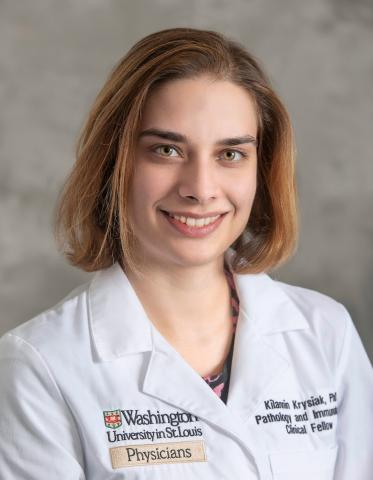
Dr Kilannin Krysiak, a Clinical Fellow with the Washington University School of Medicine’s Department of Pathology and Immunology, recently concluded a two-week visit to Melbourne as an Expert-in-Residence with Melbourne Genomics, sharing her skills and experience in cancer variant curation.
Dr Krysiak’s research focuses on improving patient treatment through advancing the understanding of the impact of specific genetic changes on cancer prognosis and treatment response.
We had the opportunity to ask Dr Krysiak a few questions about her work and her experience with Melbourne Genomics.
“Everyone’s been wonderful—so pleasant and so eager to collaborate,” Dr Krysiak said. “The amount of collaboration I’ve experienced between all the different groups and hospitals is a key takeaway for me.”
“It’s been enriching. The conversations I’ve had have been both high-level and nitty-gritty.”
Dr Krysiak then spoke about her clinical fellowship, and how this is contributing to her work in cancer.
“I’m getting a much better sense of clinical geneticists, [and] I think this will only enhance my understanding and the things we can do with cancer variants,” she said.
Dr Krysiak also highlighted the important role of the Clinical Interpretations of Variants in Cancer (CIViC) international knowledge-base in connecting variants and their clinical relevance – of use to clinicians and research teams throughout the world.
“Having international collaborative work is ultimately for the good of the patients,” she concluded.
To learn more about Dr Krysiak’s work, watch the full interview in the video here.
Dr Krysiak visited Melbourne as an Expert-in-Residence with the Melbourne Genomics Health Alliance, during February 2019.
